The Morphometric Examination of Head Area of Black Headed Gulls (Larus Ridibundus) from Marmara Region
The Black-headed gull (Larus ridibundus), a gull species commonly seen on shores of Küçükçekmece lake located in Marmara Region, does not exhibit sexual dimorphism as it has monomorphic feather traits like the other gull species. In order to perform sex discrimination in gulls, the effective discriminant function analysis (DFA) method is used for the measurements based on the external morphology and determining the variables discriminating the two sex groups. The head morphological measurements and the body weights of 28 adult Black-headed gulls were obtained. One discriminant function was determined based on the results. The accuracy rate in two sexes was determined to be 82.1% (85.7% female, 78.6% male) using the formula we obtained as a result of the discriminant function analysis in which the head length, determined to be more significant compared to the other variables, was used. The aim of the study is to assess the sexual dimorphism in population of Black-headed gull in Küçükçekmece Lake and its surrounding located in Marmara Region and represent a reliable method to make a sex discrimination along with discriminant analysis.
Keywords:
Avian anatomy black headed gulls, head morphometry, marmara sea,
___
- 1. Birdlife international 2016 species factsheet. Larus ridibundus. http://datazone.birdlife.org/species/factsheet/Mew-Gull. Accessed March 28, 2019.
- 2. Karabaş martı. http://www.trakus.org. Accessed March 28, 2019.
- 3. Karabaş martı. https://evrimagaci.org/karabas-marti-chroicocephalus-ridibundus-5264. Accessed March 28, 2019.
- 4. Musil P, Musilová Z, Fuchs R, et al. Long-term changes in numbers and distribution of wintering waterbirds in the Czech Republic, 1966–2008. Bird Study. 2011;58(4):450-460.
- 5. Poprach K, Machar I, Maton K. Long-term decline in breeding abundance of Black-headed Gull (Chroicocephalus ridibundus) in the Czech Republic: a case study of a population trend at the Chomoutov lake. Ekológia (Bratislava). 2016;35(4):350-358.
- 6. Van Dijk JG, Stienen EW, Gerritsen S, et al. Reproductie van de Kokmeeuw in kust-en binnenlandkolonies. Limosa. 2009;82(1):13.
- 7. Yilmaz KT. Ecological diversity of the Eastern Mediterranean region of Turkey and its conservation. Biodivers Conserv. 1997;7(1):87-96.
- 8. Kılıç DT, Eken G. Türkiye’nin önemli kuş alanları 2004 güncellemesi. Doğa Derneği Ankara. 2004;74-100.
- 9. Kış ortası su kuşu sayımı 2018. Doğa koruma ve milli parklar genel müdürlüğü (İKGT 2010). http://www.milliparklar.gov.tr/dosyalar/kosks_raporu2018.pdf. Accessed March 28, 2019.
- 10. Del Hoyo J, Elliott A, Sargatal J. Handbook of the birds of the world. 1thed. Barcelona: Lynx Edicions; 1996.
- 11. Galarza A, Hidalgo J, Ocio G, et al. Sexual size dimorphism and determination of sex in Atlantic yellow-legged gulls Larus michahellis lusitanius from northern Spain. Ardeola. 2008;55(1):41-47.
- 12. Evans DR, Hoopes EM, Griffin CR. Discriminating the sex of laughing gulls by linear measurements (Identificación del sexo en individuos de Larus atricilla utilizando medidas lineares). J Field Ornithol. 1993;472-476.
- 13. Evans DR, Cavanagh PM, French TW, et al. Identifying the sex of Massachusetts Herring Gulls by linear measurements. J Field Ornithol. 1995;66(1):128-132.
- 14. Renner M, Davis LS. Sexing little penguins Eudyptula minor from Cook Strait, New Zealand using discriminant function analysis. Emu. 1999;99(1):74-79.
- 15. Palomares, LE, Arroyo BE, Marchamalo J, et al. Sex- and age-related biometric variation of Black-headed Gulls Larus ridibundus in western European populations. Bird Study. 1997;44(3):310- 317.
- 16. Aguirre JI, Arana P, Antonio MT. Testing effectiveness of discriminant functions to sex different populations of Mediterranean Yellow-Legged Gulls Larus michahellis michahellis. Ardeola. 2009;56(2): 281-286.
- 17. Hammouda A, Selmi S. Morphometric sexing of Mediterranean Yellow-legged Gulls Larus michahellis michahellis breeding in the Gulf of Gabès, southern Tunisia. Ostrich. 2013;84(2):119-122.
- 18. Bosch M. Sexual size dimorphism and determination of sex in Yellow-Legged Gulls (Dimorfismo sexual de tamaño y determinación del sexo en gaviotas patiamarillas). J Field Ornithol. 1996;67(4):534-541.
- 19. Meissner W, Kośmicki A, Niemczyk A, et al. Development of sexual dimorphism and sexing of Baltic Herring Gull (Larus argentatus argentatus) in successive age classes. Waterbirds. 2017;40(1):24-33.
- 20. Yannic G, Broquet T, Strøm H, et al. Genetic and morphological sex identification methods reveal a male-biased sex ratio in the Ivory Gull Pagophila eburnea. J Ornithol. 2016;157(3):861-873.
- 21. Palomares LE, Arroyo B, Marchamalo J, et al. Sex- and age-related biometric variation of black-headed Gulls Larus ridibundus in Western European populations. Bird Study. 1997;44(3):310-317.
- 22. Coolson JC, Duncan N, Thomas CS, et al. An age-related difference in the bill depth of Herring Gulls Larus argentatus. Ibis. 1981;123(4):499-502.
- 23. Stermin AN, David A, Eilers A, et al. A better sex discriminator? Validity of sex-discriminating formulas in water rails Rallus aquaticus L., 1758 (Rallidae). North-Western Journal of Zoology. 2018;14(2):208-212.
- 24. Jordi O, Arizaga J. Sex differences in growth rates of Yellow-legged Gull Larus michahellis chicks. Bird study. 2016;63(2):273-278.
- 25. Taylor S, Jamieson IG: Determining sex of South Island saddlebacks (Philesturnus carunculatus carunculatus) using discriminant function analysis, Notornis. 2007;54(2):61-64.
- 26. Hallgrimsson GT, Helgason HH, Palsdottir ES, et al. Sexing adult and fledgling Lesser Black-backed Gulls from morphometrics. Ringing Migr. 2016;31(1):68-73.
- Başlangıç: 1981
- Yayıncı: Bursa Uludağ Üniversitesi
Sayıdaki Diğer Makaleler
Nilay SEYİDOĞLU, Deniz BELENLİ, Oguz MERHAN, Kadir BOZUKLUHAN
Nosema ceranae ile doğal enfekte balarısı kolonilerinde NOSEBA®’nın etkinliğinin araştırılması
Mehmet ÖZÜİÇLİ, Levent AYDIN, A. Onur GİRİŞGİN, Betül SAYGIN, Nurgül ÇİMENLİKAYA, Yiğit ALTAV, Suna Aslı ZENGİN
Berfin KADİROĞLU, Gizem ALPAY, Kadir YEŞİLBAĞ
Ozan GÜNDEMİR, Gülsün PAZVANT, Nazan GEZER İNCE
G. Ülke ÇALIŞKAN, Deniz SEYREK-İNTAŞ, Nureddin ÇELİMLİ
Goksen CECEN AYALP, İsmail ALTUĞ ŞEN, Nihal Yaşar GÜL SATAR, Sibel TOKOĞLU SERT
